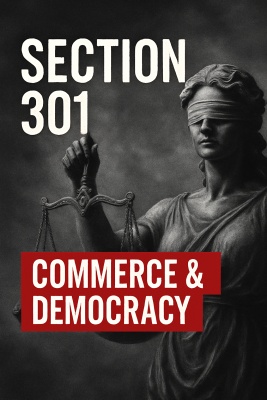Few Brazilians have heard of Section 301 of the United States Trade Act. Created in 1974, this direct and effective legal instrument may soon reshape Brazil–US relations and rebalance a geopolitical board increasingly threatened by authoritarianism disguised as legality.
Section 301 authorizes the US government to investigate and impose sanctions against countries that engage in unfair or discriminatory trade practices or erect barriers that harm American companies and values. This is not an ideological retaliation but a strategic defense of the United States’ interests in global commerce and, more broadly, of the liberal democratic order built in the post–World War II era.
What once seemed like a technical mechanism of US trade bureaucracy is now acquiring a broader role. With Brazil’s institutional crisis deepening, the US government sees in Section 301 a legitimate tool to respond to deviations from the rule of law that directly impact economic freedom, legal security, and regional stability.
The recent threat of tariffs of up to 50% on Brazilian products is not merely a commercial reprisal. In practice, it is a legalized form of pressure against a political model that consolidates itself through the suppression of dissent, the restriction of freedoms, and the transformation of the judicial system into a mechanism of intimidation.
Although not explicitly stated, the real target of such a strategy—if put into action—is the system currently entrenched in Brazil, where one constitutional branch has come to concentrate the roles of policing, prosecution, judgment, and censorship, while the others remain passive.
Invoking national sovereignty is no longer enough to dismiss international concern about the path taken by a country that was, until recently, regarded as a strategic partner and a pillar of democracy in Latin America.
At this juncture, Section 301 complements another widely discussed legal tool: the Magnitsky Act. While the latter focuses on sanctioning foreign officials involved in serious human rights violations and corruption, Section 301 targets actions that harm US economic freedoms and commercial interests.
Together, these instruments form a legal and political framework capable of responding firmly to regimes that mix institutional authoritarianism with progressive rhetoric—often protected by the appearance of constitutional legitimacy.
In Brazil’s case, concern grows in the face of clear signs of geopolitical realignment. The current administration’s increasing closeness with autocratic regimes, particularly China and its satellites, marks a historical shift away from Brazil’s traditional alignment with Western democracies. This pivot is not merely rhetorical—it materializes through strategic agreements, the transfer of sensitive technologies, growing economic dependency, and an embrace of 21st-century models of political and social control.
The US response, therefore, goes beyond trade. It is, above all, a defense of an international order based on rules and freedom. By placing Brazil under legal scrutiny, the United States sends a clear signal: abuses of power disguised as legality—even when carried out within the borders of a sovereign nation—are not immune from international accountability.
It is also a wake-up call to Brazilian leaders who still believe in the strength of democracy. The opposition, civil society, and the productive sector must recognize that international legal mechanisms are legitimate tools of resistance against authoritarian advances. Section 301 is not interference. It is a consequence. And when such a consequence comes from a historic ally, it may well be the last chance for reconciliation before total isolation.


